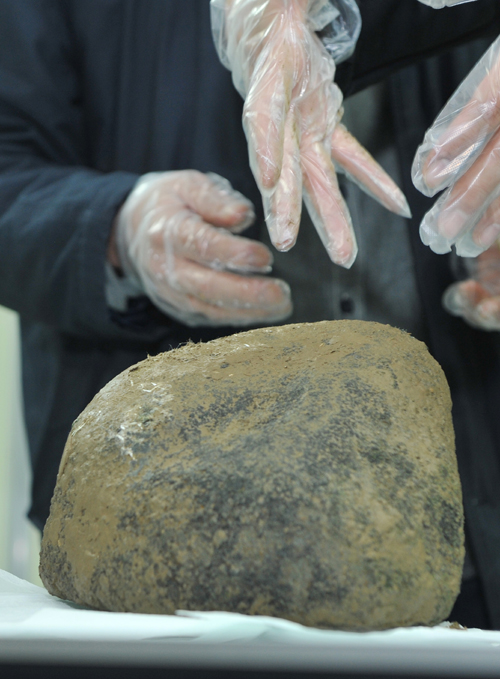-
 Korea.net's 24-hour YouTube channel
Korea.net's 24-hour YouTube channel- NEWS FOCUS
- ABOUT KOREA
- EVENTS
- RESOURCES
- GOVERNMENT
- ABOUT US
At 8:04 p.m. on March 9, four rocks hit the ground from out of nowhere, landing near Jinju in the southern part of the country.
The mysterious rocks garnered much attention from astronomers and geoscientists. As their estimated value was made public, the whole nation set off on a quest to find said rocks.

The Korea Polar Research Institute, a scientific research body that has studied the Jinju rocks, announced on November 18 that the rocks turned out to be meteorites as old as the solar system.
The analysis was done using a secondary ion mass spectrometer that analyses different minerals in the sample, and using a uranium-lead dating equation that gives the age of the sample. The team used a spectrometer that can measure a sample as thin as one-one-hundredth of a strand of hair with an ion beam.
As a result of the months-long analysis, the rocks have been found to be between 4.48 billion and 4.59 billion years old.
“The age is close to that of our solar system, at 4.56 billion years old. It proves that the rocks are meteorites,” said the research team.
By Sohn JiAe
Korea.net Staff Writer
Photo: the Korea Polar Research Institute
jiae5853@korea.kr
The mysterious rocks garnered much attention from astronomers and geoscientists. As their estimated value was made public, the whole nation set off on a quest to find said rocks.

Researchers from the Korea Polar Research Institute examine a rock that was later found to be a meteorite.
The Korea Polar Research Institute, a scientific research body that has studied the Jinju rocks, announced on November 18 that the rocks turned out to be meteorites as old as the solar system.
The analysis was done using a secondary ion mass spectrometer that analyses different minerals in the sample, and using a uranium-lead dating equation that gives the age of the sample. The team used a spectrometer that can measure a sample as thin as one-one-hundredth of a strand of hair with an ion beam.
As a result of the months-long analysis, the rocks have been found to be between 4.48 billion and 4.59 billion years old.
“The age is close to that of our solar system, at 4.56 billion years old. It proves that the rocks are meteorites,” said the research team.
By Sohn JiAe
Korea.net Staff Writer
Photo: the Korea Polar Research Institute
jiae5853@korea.kr
Most popular
- First hearing-impaired K-pop act hopes for 'barrier-free world'
- Expats could account for 7% of population in 20 years: report
- 'Mad Max' director impressed by 'cinema-literate' Korean viewers
- Show in Italy to present 'thought-filled' Korean craftworks
- Romanian presidential couple visits national cemetery













